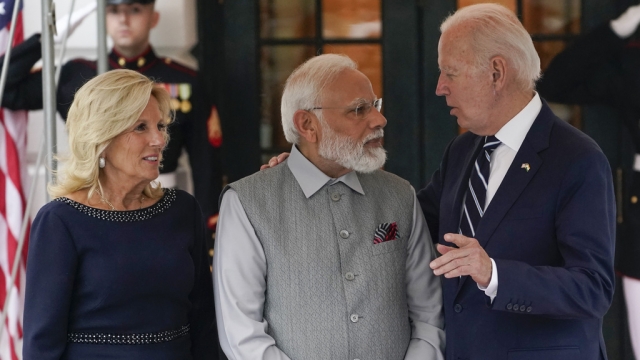President Biden will host Indian Prime Minister Narendra Modi for an official state visit Thursday as the administration looks to strengthen its relationship with the strategic partner key to the Indo-Pacific.
It marks only the third state visit for the Biden administration but 10th meeting for the leaders. The deepening relationship between countries is one U.S. leaders view as consequential for the future and have described it as "defining."
Modi will meet with President Biden and address a joint session of Congress.
"India is a key strategic partner. I think you're going to see an agenda that is very robust, covers everything from defense cooperation to climate change to technology, space, and cyberspace, as well as improving people-to-people ties," said National Security Council spokesperson John Kirby.
The administration has previewed a wide-ranging agenda for conversation between the leaders and a long list of action items described as "unprecedented," building on previous initiatives on strategic technology and defense industry cooperation.
Officials said the countries are also expected to work in the maritime environment as part of the Indo-Pacific Ocean initiative.
SEE MORE: UN: India's population will be world's largest by middle of this year
While both the United States and India have faced tensions with China, the U.S. has downplayed the visit as a response or message to China.
"It's true that both India and the United States have tensions with China. We have concerns over what China is doing around the world. But that's not the focus here," said Kirby. "The focus is really on the future of this particular bilateral relationship, which President Biden believes is going to be one of the most defining bilateral relationships of the next 10-15 years."
"Everybody knows what the game is. India has been invaded," said Rick Rossow, chair of U.S.-India policy studies at the Center for Strategic and International Studies. There's, you know, dozens or hundreds of square miles — India's never announced how much that China's holding today. They've had border conflicts. [India's] the only country that's had military confrontation with China in recent decades, and a lot of India's neighbors are also feeling territorial pressure."
With the Indian Ocean more contested, Rossow said the U.S. will look for India to be more pro-active in the Pacific.
On supply chain efforts, the administration expects more investments in India. For example, officials said Micron will announce an investment for a semiconductor assembly and test facility in India.
On space, senior administration officials said India will sign the Artemis Accords. NASA and the Indian space research organization will develop a framework for human spaceflight cooperation and agree to a joint mission to the International Space Station next year.
SEE MORE: Annual list of worst nations for religious freedom released
On critical minerals, officials said the U.S. will support India's membership in the mineral security partnership.
There will also be focus on health, technology (including artificial intelligence), climate and people-to-people exchanges. The Department of State is expected to launch a pilot program dealing with temporary work visas later in the year to adjudicate domestic renewals, according to senior administration officials.
However, there are key divergences from the United States.
Modi has faced criticism over India's relationship with Russia as it has not been as vocal in denouncing Russia's war in Ukraine. While India has helped Ukraine on the humanitarian front, the country also buys Russian oil.
"We also recognize at the time that Russia is finally ready to talk about what an end game looks like," Rossow said. "Prime Minister Modi is actually in a pretty unique position right now, one of the few global leaders that can actually speak to President Biden, President Putin, Zelenskyy, all in the same day, and try to maybe be connecting those dots in terms of what an outcome would look like. So there might be, you know, some utility in India kind of playing this middle ground," Rossow continued. "But right now, they are providing a vital economic lifeline to Russia during a difficult period."
Modi has also been criticized over human rights, religious freedom and press freedom. Dozens of lawmakers sent President Biden a letter requesting he raise issues of concern with Modi.
"A series of independent, credible reports reflect troubling signs in India toward the shrinking of political space, the rise of religious intolerance, the targeting of civil society organizations and journalists, and growing restrictions on press freedoms and internet access," the letter states.
President Biden, who considers human rights a key part of U.S. foreign policy, is expected to privately address it.
"The president's foreign policy is really rooted in a respect for and an advancement of human and civil rights around the world," said Kirby. "And he never shies away from addressing human rights concerns wherever he is, or with whatever foreign leader that he's talking to. So I fully expect that as he has done time and time again, he will raise our concerns about human rights during this particular visit."
The administration has rolled out a robust welcome for the Indian prime minister ahead of the official state dinner, which will feature elements to honor the tradition and culture of both countries. The Bidens welcomed Modi to the White House for a private dinner, tour and musical tribute Wednesday evening. Ahead of that, first lady Jill Biden and Modi visited the National Science Foundation to highlight workforce training and education.
Trending stories at Scrippsnews.com




